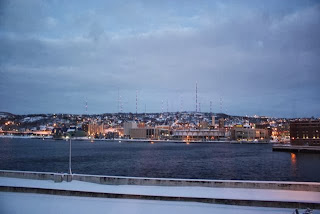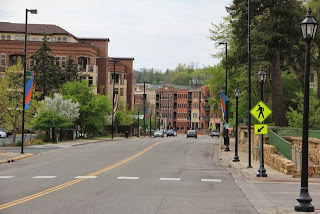I've noted elsewhere in this blog that I'm a recovering planner. Today is one of the few times in years that I'm going to relapse. Not only that, but I'm going to do something that's going to make me feel kind of foolish, but I think it's important enough that I'm going to do it anyway. Even though the temperature outside is negative 6, and it's been really cold for awhile, and I've complained about it, I want to talk about global warming and climate change. Not as a solution to our current cold snap but as a significant threat to Minnesota as we know it. The good news is we're not likely to experience something like "Superstorm Sandy," nor is Duluth likely to be inundated by rising levels in Lake Superior. The bad news is Duluth, many of our other cities, our agriculture and our forestry may all experience 500 year storms two or three times a decade.
In an interesting coincidence, the Metro Council is working on updating its regional plan this year, at approximately the same time that the Intergovernmental Panel on Climate Change is due to publish the final version of Climate Change 2013: The Physical Science Basis and Climate Change 2014: Impacts Adaptation and Vulnerability and Climate Change 2014: Mitigation of Climate Change. The relapsing planner in me thinks it would be a horrendous missed opportunity if the Council adopted its new regional plan, issued regional systems statements for the four regional systems (transportation, aviation, water resources (including wastewater collection and treatment) and regional parks and open space) and local governments started updating their comprehensive plans, before the IPCC reports were available and reviewed for relevance. Since it's also improbable that climate change and its impacts are likely to "go away" any time soon, it might be worthwhile for the 2014 legislature, as they work their way through an "unsession" to at least think about whether energy should become a fifth Regional System. If the Legislature, in its wisdom, saw fit to make energy a regional system, the Metro Council would be justified in (obligated to?) taking a lead role in looking at the regional and local development implications of various types of decentralized energy generation systems for regional and local development implications. I suspect that the resilience, green house gas, transportation implications and a number of related factors that could affect the metro area's international competitiveness would be worth planning for. Other cities and metro areas are engaging in this type of planning and implementation. If they get too far ahead, we may not have many hipster neighborhoods left to visit.
One of the things I learned when I was a practicing planner was that "No amount of planning will ever replace dumb luck. I also learned to not rely on dumb luck. There are tools available to help the Council and local governments take a hard look at the issues we're facing. I'll mention just one of them which was developed more than a decade ago. It's called PLACES. The report contains a quick summary that clearly identifies the land use / transportation / energy linkages. Here's that summary:
For 2014 I'm going to do my best to not complain without providing a proposed response to my rant. The Metro Council should not just acknowledge but strongly respond to climate change, connect the dots for folks, and reflect appropriate IPCC content in THRIVE MSP 2040. The holiday season is over. We have work to do, starting today.
Thanks for listening. Come again when you can. Rants, raves and reflections served here daily.
Thursday, January 2, 2014
Climate change in Minnesota?
Subscribe to:
Post Comments (Atom)



No comments:
Post a Comment